【最新】牛津译林版九年级英语上册Unit6 Integrated skills 学案
Unit6IntegratedskillsStudyskills课件牛津译林版九年级英语上册
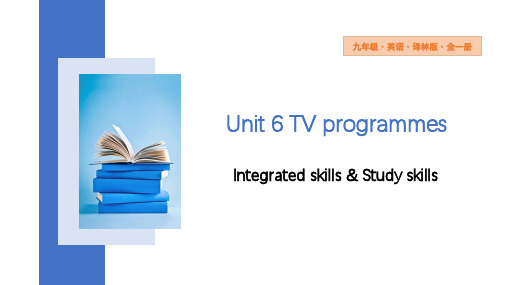
合作探究
根据汉语提示完成句子。 1.It’s only a waste of time (浪费时间) to speak to her.
2.I don’t want to waste time (浪费时间)。
.
3.Sam is a
student. He is a member of
. He loves
.I guess he likes programmes about
.
◎学法指导:尝试根据已知来推测未知,大胆推测,大声说。
合作探究
听力训练 ·导学建议·
先引导学生完成A2和A3部分的听力训练,再完成下面的练 习。 听B部分对话,回答问题。 1.Does Millie think TV ads are interesting? Yes, she does.
九年级·英语·译林版·全一册
Unit 6 TV programmes
Integrated skills & Study s要信息并能够在阅读已有的信息后预 测未知信息。 2.通过听录音获取信息,并能通过合理猜测完成听力练习。 3.能自主阅读一份英语报纸并制作一份英语报。
合作探究
自制手抄报 ·导学建议·
引导学生去图书馆或通过网络等途径获得一些英语报纸, 并观察报纸的标题、图片等内容。 和同伴一起,制作一份英语报纸。
合作探究
Watching TV ads is just a waste of time.看电视广告仅仅是 浪费时间。 ◎观察思考: We shouldn’t waste time on such a small thing.我们不应该在一 件这么小的事情上浪费时间。 He wastes a lot of time playing computer games.他浪费了许多时 间玩游戏。
新牛津译林版九年级上册unit 6《tv programmes》integrated skills优秀教案(重点资料).doc

Unit6 TV programmesIntegrated skillsTeaching goals:1.知识与技能: 进一步认识和掌握与电视节目相关的词汇、词组。
2.过程与方法: 通过分析所给材料获取重要信息并能够在阅读已有的信息后预测未知信息。
通过听录音获取新信息,并能通过合理猜测完成听力练习。
3.情感、态度与价值观: 学会表达喜欢和不喜欢,并说明原因。
Important and difficult points:用已获取的材料的关键词汇和信息来完成报告Teaching procedures:.任务一:Presentation1. Today we’re going to talk about TV viewing habits. Then ask:What TV programmes do you like or dislike?What’s your favourite programme? Why?How much time do you spend watching TV every week?2. Say: Would you like to know the TV viewing habits of some students at SUNshine MiddleSchool? Millie wants to interview three students about their TV viewing habits.Before the interviews, she has written down what she knew about the students. Let’sread the information in Part A1 and help the students to guess their favorite TVprogramme(s).favorite TV programme(s)1、要求学生在听力之前,先看A1部分的题目。
牛津译林版九年级上册英语(新)教案9AUnit6Integratedskills
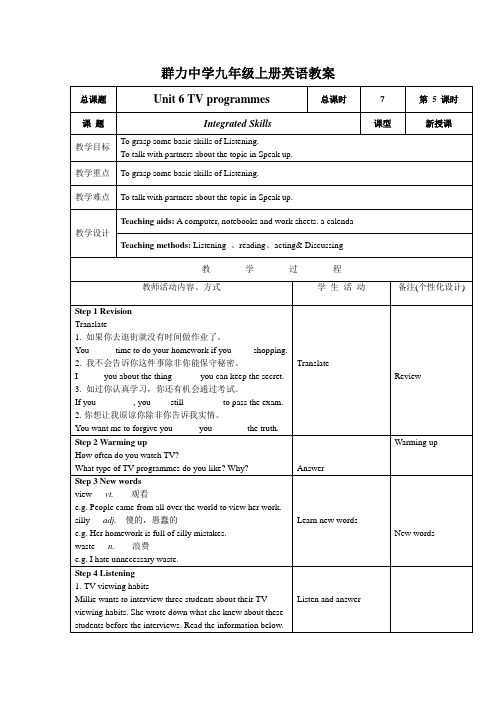
Millie: Why?
Simon: I think most of them are silly. Watching TV ads is just a waste of time.
Work in pairs
Act the dialogue out
Dialogue practice
Answer
Warming up
Step 3 New words
viewvt.观看
e.g. People came from all over the world to view her work.
sillyadj.傻的,愚蠢的
e.g. Her homework is full of silly mistakes.
Sam is a Grade (16) ___ student. He is a member of the (17)
___________. He likes (18) _____ programmes because he
thinks they are really (19) ____. His favorite programme is
Because she thinks some of them are really creative.
Answer
Answer
Speak up
Step 6 Dialogue practice
1. Work in pairs and tell your partner your point of view. Use the conversation as a model.
2. Millie is interviewing the students. Listen carefully and help her complete the notes below.
牛津译林版英语九上Unit 6《TV programmes》(Integrated skills)教

牛津译林版英语九上Unit 6《TV programmes》(Integrated skills)教学设计一. 教材分析《牛津译林版英语九上Unit 6 TV programmes》主要介绍了不同类型的电视节目。
本节课的主题与学生的生活紧密相连,有助于激发他们的学习兴趣。
教材包括不同类型的电视节目,如新闻、综艺节目、纪录片等,以及与电视节目相关的话题,如电视节目对人们的影响、如何选择电视节目等。
通过对这些话题的学习,学生可以提高自己的英语听说读写能力,同时培养自己的审美观和批判思维能力。
二. 学情分析学生在之前的学习中已经掌握了一定的英语基础,能够进行简单的英语交流。
但部分学生对于某些电视节目的类型和特点可能了解不多,因此在教学过程中需要引导学生进行观察、思考和讨论。
此外,学生可能对英语学习存在一定的焦虑情绪,需要教师在教学中给予鼓励和关爱,激发他们的学习兴趣。
三. 教学目标1.知识目标:学生能够掌握不同类型的电视节目以及与电视节目相关的话题。
2.能力目标:学生能够用英语介绍自己喜欢的电视节目,并表达自己的看法。
3.情感目标:培养学生对电视节目的审美观和批判思维能力,提高他们对英语学习的兴趣。
四. 教学重难点1.重点:学生能够用英语介绍不同类型的电视节目。
2.难点:学生能够表达自己对电视节目的看法,并进行批判性思考。
五. 教学方法1.任务型教学法:通过完成各种任务,激发学生的学习兴趣,培养他们的实践能力。
2.交际型教学法:通过小组讨论、角色扮演等活动,提高学生的英语交际能力。
3.情境教学法:创设真实的语境,帮助学生更好地理解和运用英语。
六. 教学准备1.教师准备:提前准备好相关电视节目的素材,如视频、图片等。
2.学生准备:学生预习课文,了解不同类型的电视节目。
七. 教学过程1.导入(5分钟)教师通过提问方式引导学生谈论他们喜欢的电视节目,激发学生的学习兴趣。
2.呈现(10分钟)教师展示不同类型的电视节目素材,如新闻、综艺节目、纪录片等,引导学生观察并说出它们的特点。
牛津译林版-英语-九上-6单元 Integrated skills教学设计

2. finish listening exercises by guessing and analyzing;
3. learn to talk about your TV viewing habits
Work in groups and try to give Daniel some suggestions.
3. Some suggestions given by the teacher.
1. Free talk
T: What kind of TV programme is it?S: …
T: Yes. It’s a TV ad. Do you like TV ads? S: …
(1) Does Millie like TV ads?
(2) What does she think of them?
(3) Does Simon like TV ads?
(4) What does he think of them?
1. Read the dialogue in Speak up and learn it by heart;
Make a similar conversation.
1.Listen and complete.
2.Talk about your opinions
3.Fill in the blanks.
Make an Interview and write a report.
1. Free talk.
2.Listen and answer.
牛津译林版英语九年级上册第六单元Unit 6 Integrated skills

every week watching TV. Her favourite programme is _A_n__im__a_l _W_a_t_c_h_. She does not like programmes about _co_o_k_i_n_g_. She thinks they are _b_o_r_i_n_g__.
A3 Millie is writing a draft report on the interviews. Help her complete it with the information on page 87.
I have interviewed three students at my school about their TV viewing habits. I found that they are different from each other.
•likes acting
Read part A1 and focus on the following questions.
牛津译林版九年级上册(新) Unit6Integrated skills课件(1)

Brain-storming
• How many TV programmes do you know? • Write down as many programmes as you can.
Revision: Kinds of TV programmes
cartoon
Philip is a Grade __student. 8 He is a very good ___________ football player so he likes programmes about ______. sports He thinks they are very _______. His favourite TV exciting programme is Sports _________. CityHe spends about ______ an hourevery week watching TV. He does not like watching programmes about ______ animals --- he does not interesting find them very _______.
Anita is a Grade __ 7 student. She is a member of the Art Club She is interested in _______. watching programmes about ______. animals Usually, she spends about________________every one an a half hour week watching TV. Her favourite programme is __________. Tiger Watch She does not like programmes about ______. sports boring She thinks they are _______.
英语牛津译林九上Unit6金品教案(5)(IntegratedSkills)

英语牛津译林九上Unit6:金品教案(5)(Integrated Skills)Teaching Plan for 9A Unit 6 Integrated SkillsIntegrated Skills一教学目的:To identify the context of a police interviewTo identify main ideas about two suspectsTo use information to complete notes and a report二教学重点:Words: 四会shorts record wedding highly三会millionaire occur criminal二会hairdresser kidnapPhrases and Sentences:no criminal record at his sister’s wedding be kidnappedAt 8 p.m. on 28th December ,he was at his sister’s wedding.Guan Fei was kidnapped .The victim is five years old and about one meter tall He is a postman and known Guan Dawei for about 7 years.三教学手段:Multi-Media四教学过程:Step 1. Lead-inT:If someone has been kidnapped , can you ask Eddie for help ?S:NoT:Who do you think find out the kidnapper policemen ?S:Policeman /Detective …T:Detective Lu is very famous , Now a child called Guan Fei has beenkidnapped . His father , Guan Dawei asked Detective Lu for help .Detective Lu made some notes . Please read his notes and answer thefollowing questionsQuestions :1.How old is the victim?2. When did the crime occur ?3. Who are suspects ?Step 2. Read and writeRead the notes and complete the profiles with as much information as possible .Step 3. Listen and writeIf Detective Lu wants to find out who was the kidnapper .He should interview the two suspects .Here’re Detective Lu’s interviews with them. Listen to their interviews carefully !1.Listen and get main idea .2.Listen and complete the suspect’s profiles on part A , on page 106 .3.Listen and check the answer .Step 4.Listen and answerListen to Detective Lu’s interviews with the two suspects a gain and answer the following questions:1.What is Xie Yiming’s job ?2.How long has Wang Gang known Guan Dawei ? What about Xie Yiming ?3.Did the two suspects go to the Guan’s house on 28th December ?4.Where was Wang Gang at 8p.m on 28th December ?5.Why did the kidnapper kidnap Guan Fei ?Step 5. Read and writeDetective Lu wants assistant to write a report on the kidnapping case. Please help him complete Part A3. Use the notes and profiles on page 106 to help you .1.Read and write .2.Check the answers .3.Let Ss read it freely .Homework1.<<评价手册>> Period 72.Have a discussion “Who is the kidnapper?”预习Pronunciation。
牛津译林9上Unit 6 Integrated skills 教学案
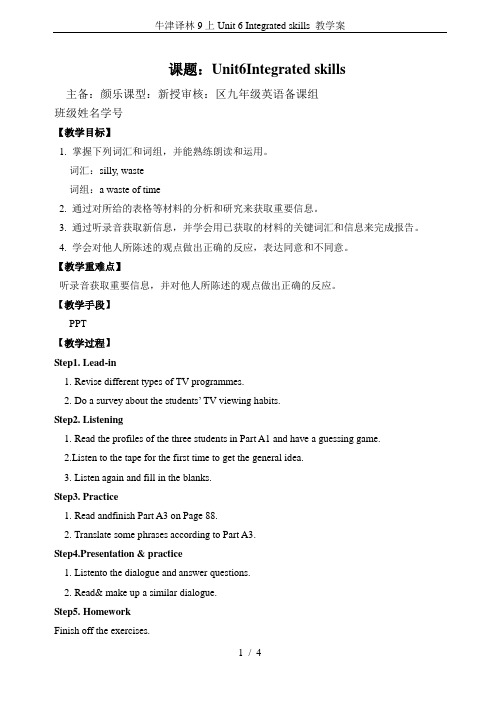
课题:Unit6Integrated skills主备:颜乐课型:新授审核:区九年级英语备课组班级姓名学号【教学目标】1. 掌握下列词汇和词组,并能熟练朗读和运用。
词汇:silly, waste词组:a waste of time2. 通过对所给的表格等材料的分析和研究来获取重要信息。
3. 通过听录音获取新信息,并学会用已获取的材料的关键词汇和信息来完成报告。
4. 学会对他人所陈述的观点做出正确的反应,表达同意和不同意。
【教学重难点】听录音获取重要信息,并对他人所陈述的观点做出正确的反应。
【教学手段】PPT【教学过程】Step1. Lead-in1. Revise different types of TV programmes.2. Do a survey about the students’ TV viewing habits.Step2. Listening1. Read the profiles of the three students in Part A1 and have a guessing game.2.Listen to the tape for the first time to get the general idea.3. Listen again and fill in the blanks.Step3. Practice1. Read andfinish Part A3 on Page 88.2. Translate some phrases according to Part A3.Step4.Presentation & practice1. Listento the dialogue and answer questions.2. Read& make up a similar dialogue.Step5. HomeworkFinish off the exercises.【课堂巩固】一、词汇运用。
牛津译林版九年级上册Unit 6《TV programmes》(Integrated skills)
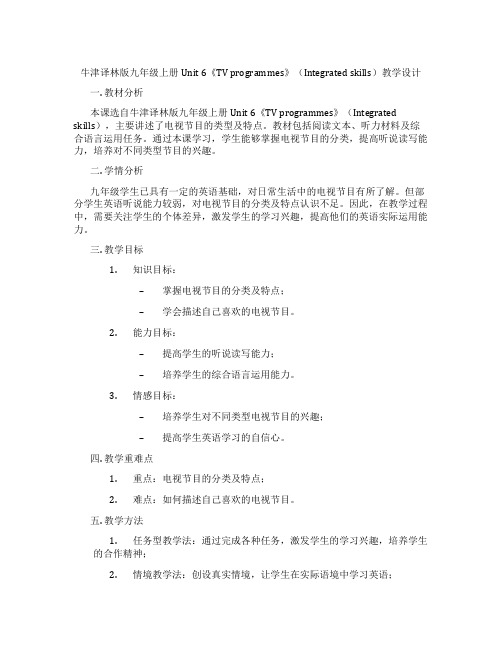
牛津译林版九年级上册Unit 6《TV programmes》(Integrated skills)教学设计一. 教材分析本课选自牛津译林版九年级上册Unit 6《TV programmes》(Integrated skills),主要讲述了电视节目的类型及特点。
教材包括阅读文本、听力材料及综合语言运用任务。
通过本课学习,学生能够掌握电视节目的分类,提高听说读写能力,培养对不同类型节目的兴趣。
二. 学情分析九年级学生已具有一定的英语基础,对日常生活中的电视节目有所了解。
但部分学生英语听说能力较弱,对电视节目的分类及特点认识不足。
因此,在教学过程中,需要关注学生的个体差异,激发学生的学习兴趣,提高他们的英语实际运用能力。
三. 教学目标1.知识目标:–掌握电视节目的分类及特点;–学会描述自己喜欢的电视节目。
2.能力目标:–提高学生的听说读写能力;–培养学生的综合语言运用能力。
3.情感目标:–培养学生对不同类型电视节目的兴趣;–提高学生英语学习的自信心。
四. 教学重难点1.重点:电视节目的分类及特点;2.难点:如何描述自己喜欢的电视节目。
五. 教学方法1.任务型教学法:通过完成各种任务,激发学生的学习兴趣,培养学生的合作精神;2.情境教学法:创设真实情境,让学生在实际语境中学习英语;3.交际法:鼓励学生积极参与课堂交际,提高口语表达能力。
六. 教学准备2.多媒体设备;3.电视节目图片;4.相关电视节目视频片段。
七. 教学过程1.导入(5分钟)–教师展示各种电视节目图片,引导学生谈论自己喜欢的电视节目;–学生分享喜欢的电视节目,教师简要介绍本课要学习的电视节目分类。
2.呈现(10分钟)–教师通过课件呈现电视节目的分类及特点;–学生跟随教师一起朗读,熟悉电视节目的分类及特点。
3.操练(10分钟)–教师播放一段电视节目视频片段,学生猜测节目类型;–学生分组讨论,总结各个电视节目的特点;–学生代表上台展示讨论成果,教师给予评价。
【最新】牛津译林版九年级英语上册Unit6 integrated skills 精品课件

every week?
Step 1 --- Read and predict Name Anita
Grade 7
Tips1:predict the possible contents by reading Some information
Philip Sam
8 9
Art club, loves playing with her cat at home Football team a very good football player Drama club likes acting
7 Anita is a Grade ______ student. She is a member of the _________. She is interested in programmes about Art Club one and a half hours ________. animals Usually she spends about ______________ every week watching TV. Her favourite programme is Animal Watch ___________. She does not like programmes about _______. boring cooking She thinks they are ________.
Post-listening
Millie is writing a draft report on the interviews. Help her complete it with the information on page 87.
TV viewing habits I have interviewed three students at my school about their TV viewing habits. I found that they are different from each other.
Unit 6 Integrated skills 教案 2022-2023学年牛津译林版英语九年级上

牛津9上Unit6 Integrated skills教学设计一、单元教材分析本单元以“TV programmes”为主题,主要围绕电视节目这一话题来展开各种教学活动。
教材的设置将功能与结构融于话题与任务中,通过话题的循环与任务的完成学习如何对电视节目进行相关的学习与讨论。
二、本节课教学内容分析综合技能围绕“看电视的习惯、喜爱的电视节目、是否喜欢电视广告”来展开听、说的任务训练,引导学生养成良好的看电视习惯,学生学生的思维表达能力。
三、学情分析九年级的学生有了一定的英语语言知识积累,前面几课时学生已经接触有关电视节目的分类及特点等,有一定的学习基础。
而且这一届的学生笔者是从七年级就开始教的,笔者对他们比较了解,学生的整体基础较好,学习的积极性较高,上课时乐于发言的学生多。
当然进入九年级,学生在情感价值方面都会有着相应的变化,另外学生在学习能力方面也有更新更高的要求,部分学生对英语还会产生一定的厌学情绪,尤其是农村学生。
随着教材难度的增加,他们对英语更是失去了初学时的兴趣。
因此在平常的教学中,我们需要尽可能地去激发他们的学习兴趣,用多媒体、图片等各种形式丰富课堂。
当然学生难以在在短短一节课内掌握那么多的单词,短语,因此课前需要带领着他们进行认真的预习。
四、设计理念在教学中充分激发学生强烈的学习愿望,在注重学生知识能力发展的同时,特别强调学生人格的发展和思维的发展。
五、教学目标分析1.知识与能力。
(1)学生能够听懂与电视节目话题相关的听力对话与短文,并能从中归纳出具体的信息。
(2)学生能够流利地用英语就有关电视节目的话题展开对话与讨论。
2.情感态度与价值观。
(1)培养学生养成良好的电视习惯,使学生能够在学习与娱乐之间很好的平衡。
(2)增进学生之间的合作,帮助学生树立团队合作精神。
六、教学重难点分析重点:(1)进行听力练习,使学生能够听懂与本单元话题相关的内容。
(2)提升学生的口语表达能力,使学生能够就电视节目这一话题展开对话与讨论。
牛津译林版九年级英语上册Unit 6 Integrated skills 示范课教案

教学活动
2.Students think and list.
3.Students have a free talk.
4.Students readtheinformation and guess.
活动层次
应用实践之描述与阐述
二、学情分析
通过本单元前面课时的学习,学生已经具备通过听力活动获取不同人对电视节目的偏好等信息的能力,并能简单介绍电视节目。但是对如何养成良好的观看电视的习惯缺乏相关的认知。
三、教学目标
通过本课时的学习,学生能够:
1.获取听力文本中有关电视节目喜好的关键信息。
2.根据已知信息,合理推测听力文本内容。
环节设计意图:引导学生获取听力文本的关键信息,并通过对文本信息进行问答,加深对文本信息的理解。
环节四:听第二段录音,获取听力的关键信息。同时基于听力内容,进行口头表达。(10 mins)
教师播放录音,学生从听力中获取细节信息并谈论相关信息。
教学活动
8.Students look and talk.
9.Studentslistenandanswer the questions.
10. Students listen and complete the passage.
11. Students make conversations.
活动层次
学习理解之感知与注意、获取与梳理
应用实践之描述与阐述
效果评价
通过倾听和巡视学生的答案,了解他们获取听力文本中细节信息的情况。
通过聆听学生的讨论,了解学生对对话内容的掌握情况。
教师引导学生看视频回答问题。
牛津译林版英语九年级上册 9A Unit6 Integrated skills

An_i_m_a_l_W__a_t_c_h. She does not like programmes about c_o_o_k_i_n_g. She thinks they are _b_o_r_in_g__.
Philip is a Grade _8_student. He is a very good foo_t_b_a_ll__p_la_y_e_r_ so he likes programmes about _s_p_or_t_s_. He thinks they are very e_x_c_it_i_n_g_. His favourite TV programme isS_p_o_r_ts__W_o_r_ld. He spends about _a_n_h_o_u_revery week watching TV. He does
—______________.
A. You’re welcome B. Never mind
C. With p
1. 可能没时间看电视 1. may not have any time to watch TV
2. 快速完成所有作业 2. complete all her homework quickly
Name
Grade
Let’s
What
preadbiocut t
we know them
Anita T半7ip功s倍:Ap听lra的ty前Cin效lg预ubw果,测iltoh。v起heser到ca事t
favorite TV programme(s)
Football Team, Philip 8 a very good football
新牛津译林版英语九年级上册Unit6Integrated skills

5. Animal Watch6. cooking 7. boring 8. 8 9. football player 10. sports 11. exciting 12. Sports World 13. an hour 14. animals 15. interesting 16. 9 17. Drama Club 18. music 19. fun 20. Music Videos 21. half an hour 22. sports
Guessing game
Now we have known their names and their interests. We also know which clubs they are in. Please try to guess which may be their favourite TV programmes.
Listening
Listen to the tape and write down the programmes they like and dislike.
likes and Anita Philip Sam
dislikes
2 hours
about about half an hour an hour
Pre-listening
牛津译林版英语九上Unit6《TVprogrammes》(Integratedskills)说课稿
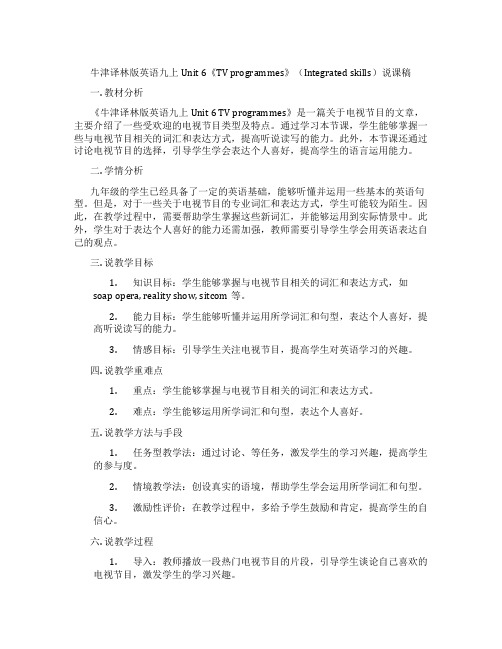
牛津译林版英语九上Unit 6《TV programmes》(Integrated skills)说课稿一. 教材分析《牛津译林版英语九上Unit 6 TV programmes》是一篇关于电视节目的文章,主要介绍了一些受欢迎的电视节目类型及特点。
通过学习本节课,学生能够掌握一些与电视节目相关的词汇和表达方式,提高听说读写的能力。
此外,本节课还通过讨论电视节目的选择,引导学生学会表达个人喜好,提高学生的语言运用能力。
二. 学情分析九年级的学生已经具备了一定的英语基础,能够听懂并运用一些基本的英语句型。
但是,对于一些关于电视节目的专业词汇和表达方式,学生可能较为陌生。
因此,在教学过程中,需要帮助学生掌握这些新词汇,并能够运用到实际情景中。
此外,学生对于表达个人喜好的能力还需加强,教师需要引导学生学会用英语表达自己的观点。
三. 说教学目标1.知识目标:学生能够掌握与电视节目相关的词汇和表达方式,如soap opera, reality show, sitcom等。
2.能力目标:学生能够听懂并运用所学词汇和句型,表达个人喜好,提高听说读写的能力。
3.情感目标:引导学生关注电视节目,提高学生对英语学习的兴趣。
四. 说教学重难点1.重点:学生能够掌握与电视节目相关的词汇和表达方式。
2.难点:学生能够运用所学词汇和句型,表达个人喜好。
五. 说教学方法与手段1.任务型教学法:通过讨论、等任务,激发学生的学习兴趣,提高学生的参与度。
2.情境教学法:创设真实的语境,帮助学生学会运用所学词汇和句型。
3.激励性评价:在教学过程中,多给予学生鼓励和肯定,提高学生的自信心。
六. 说教学过程1.导入:教师播放一段热门电视节目的片段,引导学生谈论自己喜欢的电视节目,激发学生的学习兴趣。
2.新课呈现:教师展示一些关于电视节目的图片,引导学生说出与之相关的词汇,如soap opera, reality show等。
3.教学实践:教师创设一些真实的语境,让学生运用所学词汇和句型进行交流,如讨论电视节目的特点、表达个人喜好等。
牛津译林版九年级上册Unit6《TVprogrammes》(Integratedskills)说课稿
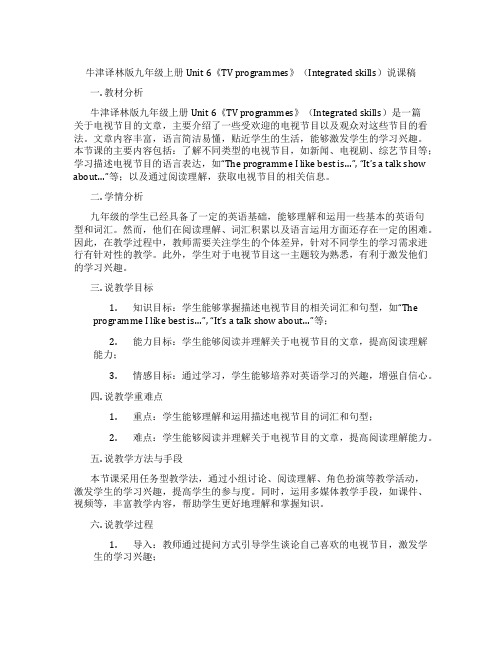
牛津译林版九年级上册Unit 6《TV programmes》(Integrated skills)说课稿一. 教材分析牛津译林版九年级上册Unit 6《TV programmes》(Integrated skills)是一篇关于电视节目的文章,主要介绍了一些受欢迎的电视节目以及观众对这些节目的看法。
文章内容丰富,语言简洁易懂,贴近学生的生活,能够激发学生的学习兴趣。
本节课的主要内容包括:了解不同类型的电视节目,如新闻、电视剧、综艺节目等;学习描述电视节目的语言表达,如“The programme I like best is…”, “It’s a talk show about…”等;以及通过阅读理解,获取电视节目的相关信息。
二. 学情分析九年级的学生已经具备了一定的英语基础,能够理解和运用一些基本的英语句型和词汇。
然而,他们在阅读理解、词汇积累以及语言运用方面还存在一定的困难。
因此,在教学过程中,教师需要关注学生的个体差异,针对不同学生的学习需求进行有针对性的教学。
此外,学生对于电视节目这一主题较为熟悉,有利于激发他们的学习兴趣。
三. 说教学目标1.知识目标:学生能够掌握描述电视节目的相关词汇和句型,如“Theprogramme I like best is…”, “It’s a talk show about…”等;2.能力目标:学生能够阅读并理解关于电视节目的文章,提高阅读理解能力;3.情感目标:通过学习,学生能够培养对英语学习的兴趣,增强自信心。
四. 说教学重难点1.重点:学生能够理解和运用描述电视节目的词汇和句型;2.难点:学生能够阅读并理解关于电视节目的文章,提高阅读理解能力。
五. 说教学方法与手段本节课采用任务型教学法,通过小组讨论、阅读理解、角色扮演等教学活动,激发学生的学习兴趣,提高学生的参与度。
同时,运用多媒体教学手段,如课件、视频等,丰富教学内容,帮助学生更好地理解和掌握知识。
最新牛津译林版中学九年级英语上册 Unit 6 TV programmes Integrated skills教案
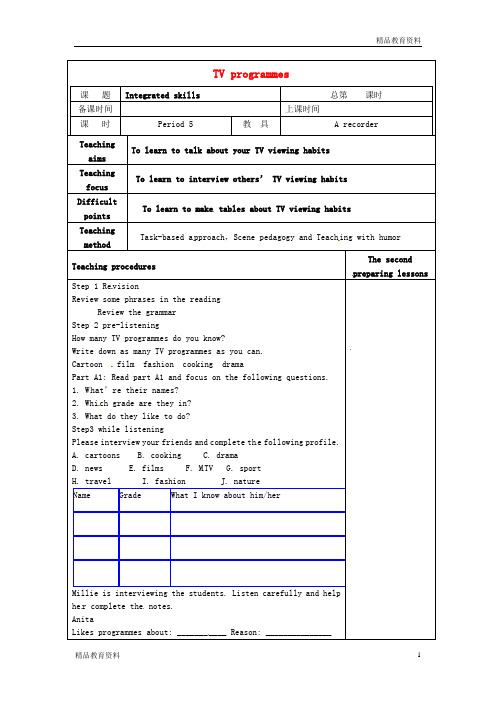
TV programmes课题Integrated skills 总第课时备课时间上课时间课时Period 5 教具 A recorderTeachingaimsTo learn to talk about your TV viewing habitsTeachingfocusTo learn to interview others’ TV viewing habitsDifficultpointsTo learn to make tables about TV viewing habitsTeachingmethodTask-based a pproach,Scene pedagogy and Teach ing with humorTeaching proceduresThe second preparing lessonsStep 1 Re visionReview some phrases in the readingReview the grammarStep 2 pre-listeningHow many TV programmes do you know?Write down as many TV programmes as you can.Cartoon film fashion cooking dramaPart A1: Read part A1 and focus on the following questions.1. W hat’re their na mes?2. Whi ch grade are they in?3. What do they like to do?Step3 while listeningPlease interview your friends and complete th e following profile.A. cartoonsB. cookingC. dramaD. newsE. filmsF. M TVG. sportH. travel I. fashion J. natureName Grade What I know about him/herMillie is interviewing the students. Listen carefully and help he r complete the notes.AnitaLikes programmes about: ___________ Reason: _______________Dislik es programmes about: _________ Reason: ______________ Favourite programme: __________________________Time spent watching TV every week: __________________________ Phil ipLikes pro grammes about: _________Reason: ____________Dislikes programmes about: _________ Reason: _____________ Favourite programme: _______________________Time spent watching TV every week: _______________________ SamLikes programmes about: ___________ Reason: _______________ Disli kes programmes about: _________ Reason: ____________ Favourite programme: ______________________Time spent watching TV every w eek: ______________________ Listen to Simon and Millie’s convers ation.Talk about your opinion — do you like TV ads? What kind of ads do you like?Step4post listeningPart A3 Fill in the blanks.Step 5 Homework.1. Review the words and expressions.2. Finish the exercises.3. Preview Task.Teachingnotes。
- 1、下载文档前请自行甄别文档内容的完整性,平台不提供额外的编辑、内容补充、找答案等附加服务。
- 2、"仅部分预览"的文档,不可在线预览部分如存在完整性等问题,可反馈申请退款(可完整预览的文档不适用该条件!)。
- 3、如文档侵犯您的权益,请联系客服反馈,我们会尽快为您处理(人工客服工作时间:9:00-18:30)。
Unit6 Integrated skills 学案一、教学目标知识目标1.To learn to talk about your TV viewing habits2.To listen for specific information and extract the related information.3.To express the things that they like or dislike.教学重点、难点1.How to extract the specific information from what they hear or read.2. To finish some more exercises well.二、词汇、短语三、句型(语法)1. Watching TV ads is just a waste of time.看电视广告就是浪费时间。
a wa ste of time,意思是“浪费时间”。
waste 为名词“浪费”,waste还可用作动词,表示“浪费”。
e.g. waste time/ money 浪费时间/钱2. TV viewing habitsview n.视野,风景,见解e.g. His view of life is different from yours.他的人生观与你的不同。
I would like to enjoy the beautiful views of Mount Huang.我想欣赏黄山的美景v.看,考虑e.g. The attack on the ship was viewed as an act of war.攻击了那条船已视作战争行为。
3.We look forward to hearing from you soon.hear from sb ...意为:收到某人的来信= get / receive a letter from sblook forward to sth/ doing sth. 期望做某事(注意:to是介词)4. a 5-year-old boy 五岁大的,5-year-old只能修饰名词,.类似的例如:an 18-floor building,a 2-hour film.5. On one’s way to....意为:在某人去...的路上。
例如:on my way to school,on ourway to the park.但如果是home,there,here,只能说成:on my way home/there/here6. in need 意为“在危难中,在贫困中,有需要帮助的”扩展:in need of 意为:有......的需要。
患难见真情。
A friend in need is a friend indeed.7. take part in / join in (doing) sth. 参加(做)某事【课前导学】1. 翻译下列词组。
1. 看电视的习惯_____________________2. 和…不一样_______________________3.被发现死了________________________4.它们中的大多数____________________5.电视广告__________________________6. 时间的浪费_______________________【课堂学习】Step1. Le ad-inRevise different kinds of TV programmes. Show them some pictures.Step2. PresentationShow them a video and learn some new words and expressions.Step3.Speak up: Do you like TV ads?1. Presentation1. Ask the students: Do you like watching TV ads? What do you think of ads?2. Millie and Simon are giving their view s on TV advertisements. Let’s listen to the tape and answer some questions.(1)Does Millie like TV ads?(2)Why does Millie think so?(3)How about Simon?(4)Why does Simon hate them?Step4. Practicing1. Now work in pairs and read the conversation. One will play the role of Simon, and the other will play the role of Millie. Then change roles.2. Show the students more words and sentence structures to help them.I (do n3. Choose several groups to act out their conversations.Step5. Listening1. Different people have different TV viewing habits.Please read the information about the three students Anita, Philip and Sam in PartA1.2. Pre-listening: Read and predict3. ListeningMillie is interviewing the students. Listen carefully and help her complete the notes below.Play the tape for the third time, ask the students to read it after the tape to check if they miss any information.Step6. Practicing1. Millie is writing a draft report on the interviews. Let’s help her complete Part A3 with the information on page87.2. Ask the students to write the answers on the blackboard to check the answers together, then, ask three students to read the report aloud.Step7. Ac tivityDivide the students into groups of four to group work to discuss :What is a good/bad TV viewing habit?Step8. HomeworkDesign a TV viewing plan for one of your family members as a Christmas present. ( programmes recommended; timetable, channels, tips…)【课后拓展】一、词汇运用1. Whenever he thinks of his pet’s ____________( die ) ,he feels very sad.2. If you aren’t interested in sports programmes, you’ll find it ______________ ( bored ).3.Ten people , __________(包含)a baby , were hurt in the crash .4.The key is one of the ________(导演的) over there.二、单项选择( ) 1. It's silly_______ you_______ other's homework.A. of; copyB. for; copyC. of; to copyD. for; to copy( ) 2. —Is Jim at home by himself ? —No, There is another boy _____ with him.A. playingB. playC. playsD. to play( ) 3. Today’s News is on Golden TV _____7 p.m. ______ 7.30 p.m.A. from; andB. between; toC. between; andD. from; between( ) 4. I really don’t know what to _______ about such a thing.A. sayB. speakC. talkD. t ell( ) 5. It’s the third time you _______ late this month.A. have reachedB. head reachedC. have arrivedD. had arrived三、缺词填空Students sit in the classroom listening to the teacher. This is a way of l_________. Is this the o_______ wayfor students to learn something? Of course not. There is a ___________ way to learn. That is students can teach t____________. How do you teach yourself? The first thing you m____________ do is reading. Reading something you are i___________ in, or you have to read. The second is that you must ask yourself questions. The q_____________ is something you don’t underst and, or you want to know more a___________ it. A clever student is usually good at a____________ questions. If you keep doing like this for a long time, you are sure to s_______________ in your study.四、完型填空Most adults once studied at school, had classes and did their homework every day. The same __1____ is going on at school now. ____2___ it seems that doing weekend homework is ___3____ problem for the modern students.All the students s hould agree that weekend homework should be abolished(取消). It's ____4___ for them studying at school five days a week. They have a lot of interests. With homework to do on Saturday and Sunday, when can they find __5_____ to help around the house, go and see a football or basketball game or a good film, join in family recreations(娱乐), or just have ___6___ at home? Because of these other activities, the homework can't be finished until ____7___. So their weekend homework is usually done in such a hurry that on Monday teachers are ____8____ and often threaten to fail whole class of students because they know nothing about the __9____. If there were no weekend homework for the students to do, they would be happy to go to school on Monday ___10___ having a good rest and to learn what the teachers teach.( ) 1. A. thing B. school C. class D. homework( ) 2. A. Also B. But C. Still D. Though( )3. A. no B. another C. one D. other( )4. A. not enough B. enough C. no good D. no use( )5. A. friends B. time C. places D. money( )6. A. a rest B. an exam C. a lesson D. a picnic( )7. A. Monday afternoon B. Saturday afternoonC. Friday nightD. Sunday night( )8. A. pleased B. sorry C. unhappy D. not worried( )9. A. lesson B. games C. interests D. activities( )10. A. until B. when C. be fore D. after。
